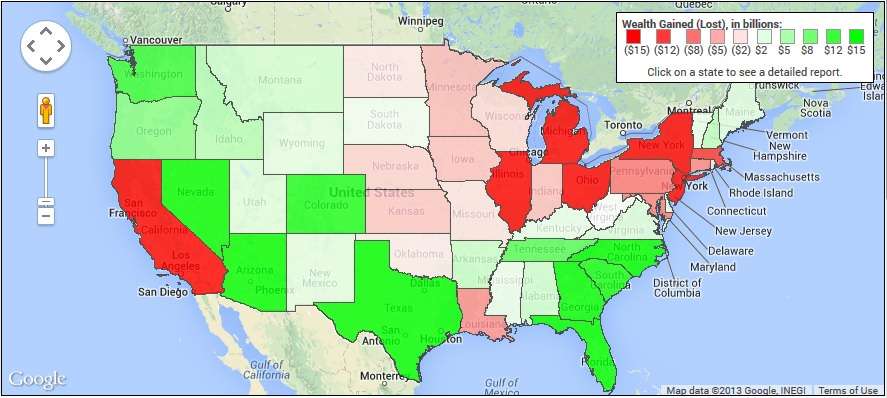Red vs. Blue Battle Continues, as Money Flows From California to Texas

The Washington Post continues the recently popular sport of contrasting Texas and California political styles and attitudes toward the size of the state, and then posing the federalism-defying question: Which is the better model for America's future? (Cue ominous music in the background.) Strictly speaking, there should be room in the United States for a variety of policy experiments, so long as basic liberties are respected. People can then vote with their money and their feet. And, in fact, as the article and data from elsewhere indicate, Americans have favored Texas with their votes for many years.
From Dan Balz at the Washington Post:
Perry ran for president in 2012 championing Texas as an economic model for the nation, pointing to the tax and regulatory structure of the Lone Star State as the engine that had helped produce more new jobs in the post-recession America than any other state. His campaign faltered, but that did little to dim the story of "Texas rising."
"California declining" was the narrative Brown inherited when he returned to Sacramento in January 2011. The Golden State, once the envy of the nation, was beset with problems, including high unemployment, persistent budgetary imbalances and political dysfunction in the state capital. Today, with the state's fiscal situation stabilized, Brown is described as the Democrat who is giving the country a new model of progressive governance.
Perry continues to promote the contrasting narratives. "These are big, powerful economic states," he said in a recent interview. "Twenty years ago, California was considered to be the absolute economic center of America. You pointed to California and said, 'Gee, wouldn't you like to be like them?' And I would suggest that's not the case, and I will suggest to you that's because of the burdensome tax environment, a regulatory climate that is very unpredictable and unstable and public schools that are continuing on a downward trajectory."
Brown and his advisers find the Texas-vs.-California story tiresome. "Shakespeare said comparisons are odious," Brown quipped in a recent telephone interview. "Another version was that they're odorous."
He was quick to counter Perry's claim that Texas should be the nation's model. Yes, he said, if you want to build something, you can do it faster in Texas than in California, where there are more regulations and governmental red tape. "That's true," he said, but he added, "Would you rather live in Houston or Santa Barbara, or maybe Santa Monica or San Francisco?"
There's a reason Brown and company find the comparison "tiresome." That is, more people seem to prefer the Texas model over the California model. That's despite the real advantages that California historically has held as a refuge for people looking for open minds and social elbow room. Stephen Levy, director of the Center for the Continuing Study of the California Economy, insists, "If you look at the areas that are the most tolerant — the Bay area and Hollywood — you find the highest clusters of creativity and innovation." That's long been true, but it's probably not enough in an era when Texas and California aren't as far apart on the tolerance issue as they were in the past (a plurality of Texans now support gay marriage).
And, in fact, the Post points to Census Bureau figures showing that, last year, "63,000 people moved from California to Texas, while 43,000 in Texas moved to California."
Just as important, money moved, too. Travis H. Brown, author of How Money Walks, points to IRS figures that track the flow of wealth from some states and to others. From 1992 -2010, California was a net loser of $45.27 billion in adjusted gross income. $6.02 billion of that went to Texas. Texas, on the other hand, gained $24.94 billion in AGI during those years, with California the top source for transfers.

Reason's Matt Welch chatted with Travis Brown last summer to discuss the things that inspire people to move themselves, their businesses, and their money from one place to another, no matter what pundits think they should be doing. The video is below.


Show Comments (57)